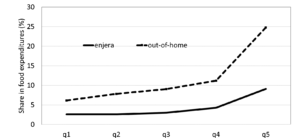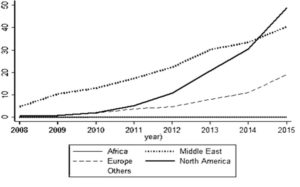Important changes are happening in agricultural markets worldwide. The rapid growth of cities and the emergence of an urban middle class are transforming food systems, and in particular, the food processing industry. In Ethiopia, this industry employs 1 million people, around 2 percent of the economically active population, however the way this food processing industry is changing and how it functions, is little understood.
Recently conducted research by ESSP focused on the commercial aspect of enjera (Ethiopia’s traditional staple pancake) making and its relation to: rice imports used in the mixing of enjera; the characteristics of different scales and locations of enjera making enterprises (EMEs); and the changing nature of the workforce, notably women, engaged in this growing urban market.

Rod Waddington
Moreover, the research found striking changes occurring in the behavioral patterns of enjera consumers. With a rising middle class in Ethiopia, and an increasing demand for teff in urban centers, eating out of the home is an increasingly popular activity with rising amount of household expenditure being put towards this pastime. Figure 1 illustrates this changing consumer behavior through the increases in expenditure over time.
Figure 1: Changes in expenditure on eating out of home and on buying enjera over time
Not only has consumption of enjera increased over time, but the rise in exports of fresh enjera to places with large populations of Ethiopians continues to rise, as shown in Figure 2. This naturally has huge implications for international trade, as well as on the enterprises supplying the export market.
Figure 2: Growth of enjera export by destination
This transforming food sector has potentially significant impacts on food policy in Ethiopia. In particular, employment impacts on the off-farm segment (especially for women) and the knock-on effect on farming households, as well as the issues around international trade with these transforming food systems. Moreover, stimulating local rice production to substitute for current imports of rice, could have economically attractive effects.
A new ESSP Working Paper on this research will be available shortly.
Please subscribe to receive regular updates on ESSP’s work.


